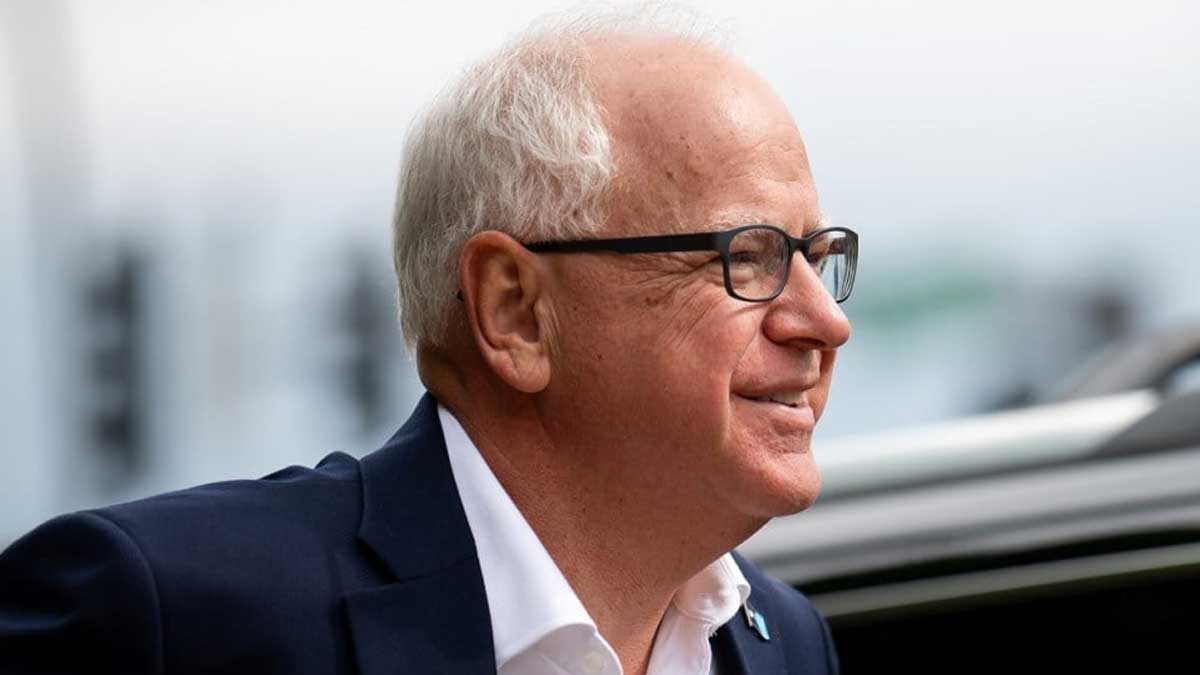- Home
- Billionaires
- Investing Newsletters
- 193CC 1000
- Article Layout 2
- Article Layout 3
- Article Layout 4
- Article Layout 5
- Article Layout 6
- Article Layout 7
- Article Layout 8
- Article Layout 9
- Article Layout 10
- Article Layout 11
- Article Layout 12
- Article Layout 13
- Article Layout 14
- Article Sidebar
- Post Format
- pages
- Archive Layouts
- Post Gallery
- Post Video Background
- Post Review
- Sponsored Post
- Leadership
- Business
- Money
- Small Business
- Innovation
- Shop
Recent Posts
Tim Walz’s Shift from NRA Supporter to Gun Control Advocate

On Tuesday, Vice President Kamala Harris announced Minnesota Governor Tim Walz as her running mate for the upcoming election. Walz, who once held strong pro-gun positions and received notable support from the National Rifle Association (NRA), has undergone a significant shift in his stance on gun legislation. As both a gubernatorial candidate and now as governor, Walz has embraced a more restrictive approach to gun control, diverging sharply from his previously NRA-friendly record.
Before becoming governor, Walz represented a rural congressional district in Minnesota, where he earned a reputation as a staunch defender of gun rights. During this period, Walz received “A” ratings from the NRA and was endorsed by the organization. In a 2010 statement, he expressed pride in aligning with the NRA, emphasizing his commitment to defending Second Amendment rights.
As a congressman, Walz supported legislation that made it easier for veterans deemed “mentally incompetent” to own guns and opposed stricter gun control measures in Washington, D.C. He also sponsored a bill aimed at expanding access to hunting and recreational shooting. His pro-gun stance was well-aligned with NRA priorities, earning him considerable backing from the organization.
However, the 2018 Parkland, Florida, school shooting marked a turning point in Walz’s perspective on gun control. As a gubernatorial candidate, Walz publicly advocated for stricter gun regulations in an op-ed for the Minneapolis Star-Tribune. He criticized the NRA, calling it “the biggest single obstacle to passing the most basic measures to prevent gun violence in America.” Walz expressed support for what he termed “common-sense reforms,” including universal background checks, a ban on “bump stocks,” and restrictions on gun purchases for individuals on the No Fly List.
Walz also made headlines by donating the $18,000 in NRA contributions he had received to a charity supporting families of military personnel killed or injured in service. Additionally, he voiced support for an assault weapons ban, further distancing himself from his former allies.
As governor, Walz has continued to advocate for gun control. In 2023, he signed a series of legislative measures aimed at tightening gun regulations. These included universal background checks and “red flag” laws designed to facilitate the removal of firearms from individuals deemed at high risk of harming themselves or others.
In his 2023 State of the State address, Walz addressed his transformation on gun issues, stating, “I know guns as well as anyone else in this room … I know that there’s no place for weapons of war in our schools, or our churches, or in our banks, or anywhere else people are just trying to live their lives without fear.” Reflecting on his change in stance, Walz noted, “I got an A rating from the NRA my first term in Congress. Now I get straight F’s. And I sleep just fine.”
Despite his shift in policy, Walz remains an avid hunter. He recently shared a photo on Twitter of a yard full of turkeys, humorously noting, “For the past few years I’ve not seen a turkey while hunting. Today they mock me.”
Walz’s selection as Harris’ running mate follows his consideration among several potential candidates, including Pennsylvania Governor Josh Shapiro, Senator Mark Kelly (D-Ariz.), and Kentucky Governor Andy Beshear. Originally from Nebraska, Walz’s background includes service in the Army National Guard and a lengthy career as a school teacher, where he taught social studies, coached football, and led the school’s Gay-Straight Alliance.
Walz’s evolving position on gun control has drawn criticism from Republicans. Once viewed as a moderate, Walz is now seen by some as pushing the Harris ticket further to the left. The Trump campaign has characterized Harris’ choice of Walz as a move that aligns with the “radical left,” asserting that it represents a continuation of a “dangerously liberal, weak, and failed agenda.”
Walz’s selection comes amid ongoing debates over gun control in Congress. Despite efforts to pass significant gun reform legislation in response to numerous mass shootings, Congress has failed to enact major changes, with Republicans maintaining opposition to more restrictive measures. The Supreme Court’s recent rulings have also opened the door to additional legal challenges against existing gun control regulations, complicating the landscape for potential future reforms.
As Walz steps onto the national stage alongside Harris, his complex history with gun legislation underscores the broader political and ideological divides surrounding this contentious issue. His transition from a pro-gun advocate to a proponent of stricter controls reflects the evolving nature of gun politics in America and will likely influence the discourse as the campaign progresses.
Recent Posts
Categories
- 193cc Digital Assets2
- 5G1
- Aerospace & Defense46
- AI37
- Arts3
- Banking & Insurance11
- Big Data3
- Billionaires449
- Boats & Planes1
- Business328
- Careers13
- Cars & Bikes76
- CEO Network1
- CFO Network17
- CHRO Network1
- CIO Network1
- Cloud10
- CMO Network18
- Commercial Real Estate7
- Consultant1
- Consumer Tech180
- CxO1
- Cybersecurity68
- Dining1
- Diversity, Equity & Inclusion4
- Education7
- Energy8
- Enterprise Tech29
- Events11
- Fintech1
- Food & Drink2
- Franchises1
- Freelance1
- Future Of Work2
- Games141
- GIG1
- Healthcare78
- Hollywood & Entertainment186
- Houses1
- Innovation42
- Investing2
- Investing Newsletters4
- Leadership65
- Lifestyle11
- Manufacturing1
- Markets20
- Media193
- Mobile phone1
- Money13
- Personal Finance2
- Policy567
- Real Estate1
- Research6
- Retail1
- Retirement1
- Small Business1
- SportsMoney33
- Style & Beauty1
- Success Income1
- Taxes2
- Travel10
- Uncategorized8
- Vices1
- Watches & Jewelry2
- world's billionaires418
Related Articles
Trump Moves $4B Stake in Truth Social Parent, Stock Drops 6%
Donald Trump recently transferred his 57% stake in Trump Media & Technology...
By 193cc Agency CouncilDecember 20, 2024House Rejects Trump-Backed Funding Bill, Shutdown Looms
The U.S. House of Representatives rejected a new government funding bill on...
By 193cc Agency CouncilDecember 20, 2024Trump Named Time’s Person of the Year for Second Time
On Thursday, Time magazine honored Donald Trump as its “Person of the...
By 193cc Agency CouncilDecember 12, 2024Meta Donates $1 Million to Trump’s Inaugural Fund
Meta, the parent company of Facebook and Instagram, has confirmed a $1...
By 193cc Agency CouncilDecember 12, 2024















Leave a comment